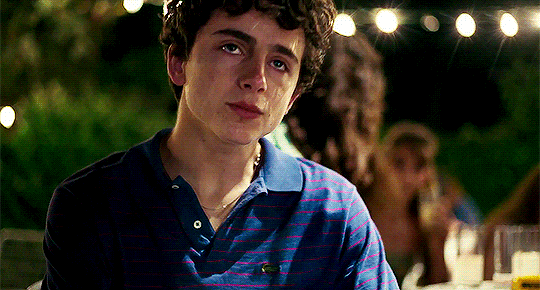



Luca Guadagnino
Every frame of this film is like the exhale of a half-smoked cigarette, a haze of a memory of a dream. This is, I’m sure, what falling in love in the eighties somewhere in Northern Italy would be like. A film for every time you’ve heard music when there’s no music playing or when you’ve started sweating in the cold winter, a fog of beauty and ugliness and confusion that is sometimes painful, sometimes awkward, suffocating you with every untrained thought. Suffocating like the drag of a cheap cigarette. And as the music starts to play and the credits come up, we start to wonder, “Is that really it?” Over just as soon as it started, no happy ending for us? And all you can do now is look back and feel and remember, and cry if you need to. This is what falling in love would be like, I’m sure.
Every frame of this film is like the exhale of a half-smoked cigarette, a haze of a memory of a dream. This is, I’m sure, what falling in love in the eighties somewhere in Northern Italy would be like. A film for every time you’ve heard music when there’s no music playing or when you’ve started sweating in the cold winter, a fog of beauty and ugliness and confusion that is sometimes painful, sometimes awkward, suffocating you with every untrained thought. Suffocating like the drag of a cheap cigarette. And as the music starts to play and the credits come up, we start to wonder, “Is that really it?” Over just as soon as it started, no happy ending for us? And all you can do now is look back and feel and remember, and cry if you need to. This is what falling in love would be like, I’m sure.

It’s the summer of Nineteen-Eighty Three, somewhere in the north of Italy and after weeks of flirtation and romance, Twenty Four year-old Oliver and Seventeen year-old Elio are savouring their last night together in Luca Guadagnino’s masterpiece of queer cinema. They are locked in a passionate embrace. Guadagnino draws our attention to how fleeting these intense interactions are. Oliver repeatedly rushes out of the frame with a hurried “later”, the camera then lingering on Elio’s confused or baffled face, effectively stretching out and magnifying every tiny interaction with Oliver. When Elio first shows Oliver around the nearby town Crema, Elio is still in the midst of answering Oliver’s question when he realises that Oliver is already packing up his belongings — before leaving the frame, and Elio. The pattern repeats when Oliver makes his most forward move, massaging Elio’s shoulder during a volleyball game: his arm invades the frame, then he himself invades Elio’s personal space. Before Elio has any time to process what is happening, Oliver runs out of the frame and back to his game. Even when Guadagnino focuses on Elio, Oliver haunts the periphery of the frame, making us as aware as Elio is of Oliver’s presence and absence. While Elio transcribes music at the foreground of the frame, Oliver is visible in the background, pedalling his bike. Just as often, it’s the sound of Oliver that intrudes.
It’s the summer of Nineteen-Eighty Three, somewhere in the north of Italy and after weeks of flirtation and romance, Twenty Four year-old Oliver and Seventeen year-old Elio are savouring their last night together in Luca Guadagnino’s masterpiece of queer cinema. They are locked in a passionate embrace. Guadagnino draws our attention to how fleeting these intense interactions are. Oliver repeatedly rushes out of the frame with a hurried “later”, the camera then lingering on Elio’s confused or baffled face, effectively stretching out and magnifying every tiny interaction with Oliver. When Elio first shows Oliver around the nearby town Crema, Elio is still in the midst of answering Oliver’s question when he realises that Oliver is already packing up his belongings — before leaving the frame, and Elio. The pattern repeats when Oliver makes his most forward move, massaging Elio’s shoulder during a volleyball game: his arm invades the frame, then he himself invades Elio’s personal space. Before Elio has any time to process what is happening, Oliver runs out of the frame and back to his game. Even when Guadagnino focuses on Elio, Oliver haunts the periphery of the frame, making us as aware as Elio is of Oliver’s presence and absence. While Elio transcribes music at the foreground of the frame, Oliver is visible in the background, pedalling his bike. Just as often, it’s the sound of Oliver that intrudes.


